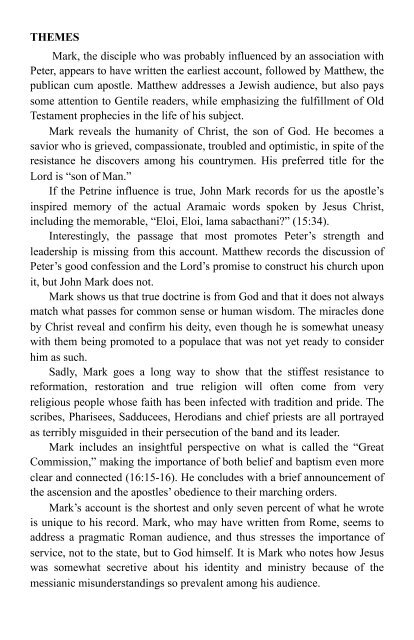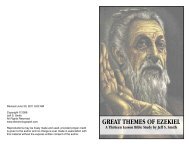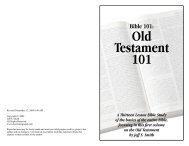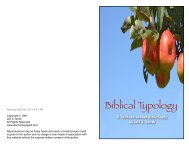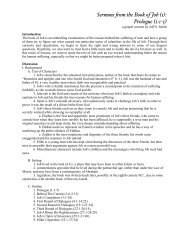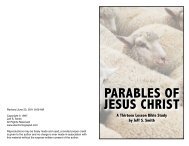New Testament Study Guides - ElectronicGospel
New Testament Study Guides - ElectronicGospel
New Testament Study Guides - ElectronicGospel
You also want an ePaper? Increase the reach of your titles
YUMPU automatically turns print PDFs into web optimized ePapers that Google loves.
THEMES<br />
Mark, the disciple who was probably influenced by an association with<br />
Peter, appears to have written the earliest account, followed by Matthew, the<br />
publican cum apostle. Matthew addresses a Jewish audience, but also pays<br />
some attention to Gentile readers, while emphasizing the fulfillment of Old<br />
<strong>Testament</strong> prophecies in the life of his subject.<br />
Mark reveals the humanity of Christ, the son of God. He becomes a<br />
savior who is grieved, compassionate, troubled and optimistic, in spite of the<br />
resistance he discovers among his countrymen. His preferred title for the<br />
Lord is “son of Man.”<br />
If the Petrine influence is true, John Mark records for us the apostle’s<br />
inspired memory of the actual Aramaic words spoken by Jesus Christ,<br />
including the memorable, “Eloi, Eloi, lama sabacthani?” (15:34).<br />
Interestingly, the passage that most promotes Peter’s strength and<br />
leadership is missing from this account. Matthew records the discussion of<br />
Peter’s good confession and the Lord’s promise to construct his church upon<br />
it, but John Mark does not.<br />
Mark shows us that true doctrine is from God and that it does not always<br />
match what passes for common sense or human wisdom. The miracles done<br />
by Christ reveal and confirm his deity, even though he is somewhat uneasy<br />
with them being promoted to a populace that was not yet ready to consider<br />
him as such.<br />
Sadly, Mark goes a long way to show that the stiffest resistance to<br />
reformation, restoration and true religion will often come from very<br />
religious people whose faith has been infected with tradition and pride. The<br />
scribes, Pharisees, Sadducees, Herodians and chief priests are all portrayed<br />
as terribly misguided in their persecution of the band and its leader.<br />
Mark includes an insightful perspective on what is called the “Great<br />
Commission,” making the importance of both belief and baptism even more<br />
clear and connected (16:15-16). He concludes with a brief announcement of<br />
the ascension and the apostles’ obedience to their marching orders.<br />
Mark’s account is the shortest and only seven percent of what he wrote<br />
is unique to his record. Mark, who may have written from Rome, seems to<br />
address a pragmatic Roman audience, and thus stresses the importance of<br />
service, not to the state, but to God himself. It is Mark who notes how Jesus<br />
was somewhat secretive about his identity and ministry because of the<br />
messianic misunderstandings so prevalent among his audience.


